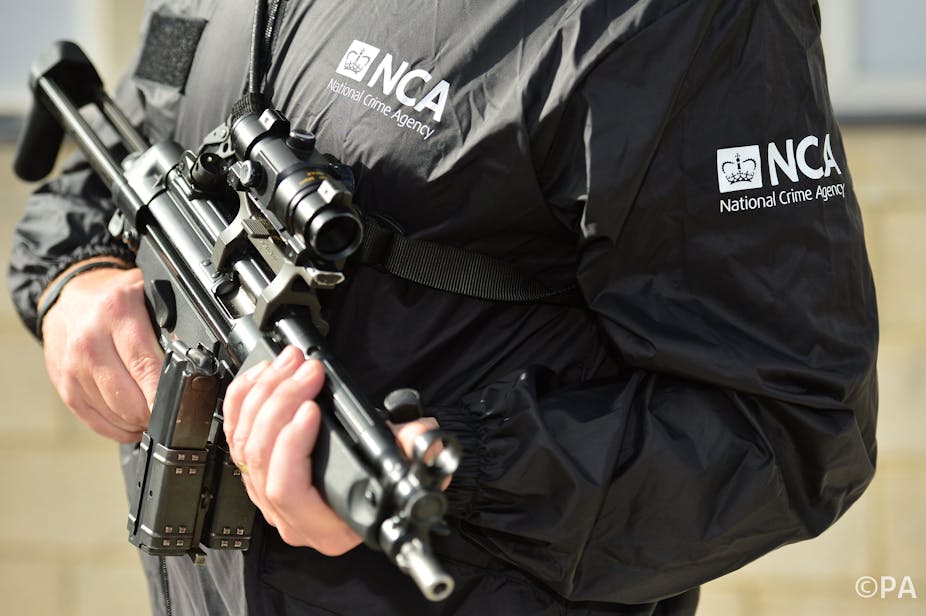The National Crime Agency (NCA) was launched this morning with the aim of being fully operational by December 2013. It is the third agency so far to be called “Britain’s FBI” following the National Criminal Intelligence Service (NCIS) and the Serious Organised Crime Agency (SOCA).
Critical commentators see this kind of acronym switching as a bureaucratic shell game – involving sleight of hand that prevents taxpayers/voters from seeing a problem with policy implementation. The policy these agencies should have delivered was organised crime control policy. But this has been hard to discern over the years.
Until the 1980s, the policing of the thing now known as organised crime in Britain was always a relatively low key and essentially local affair. In the US, by contrast, policy makers created something that was clearly not low-key. Prohibiting commercialised sex, gambling, the sale of alcohol, during the 1920s, and certain kinds of drugs such as heroin, cocaine and cannabis, created vast illegal markets for corrupt lawyers and cops and violent entrepreneurs to exploit.
Until the 1980s, British governments supported more pragmatic policies that kept illegal markets minimal. Instead of prohibiting alcohol, for example, they laid down restrictions on the time and places where it could be bought. Similarly with drug use, the response was either to make the use of these drugs a public health issue or, more usually, to turn a blind eye to behaviour so long as it was only likely to harm those who consumed. As a result, although Britain had a long history of moral panics, these had little influence on the policing of organised crime and the control of drugs until recent decades.
Pragmatism ended during the 1980s as the Thatcher government responded to pressure from the media and an intense US pressure. New types of drug-related stories began to appear on TV screens and in the newspapers. Britain now had its own drug “barons”, “czars”, “Mafias” and “Mr Bigs”, seizures were reported not just in weight but in more impressive, but fictional, “estimated street values”.
Groups of ordinary criminals were now more likely to be described as “armies”, “corporations” or national security “threats” in a nation beginning to become a national security state on the US model.
Margaret Thatcher followed Ronald Reagan’s example by visiting the customs area at Heathrow airport accompanied by TV and press cameras and repeating Reagan’s warning to drug traffickers: “We are after you. The pursuit will be relentless. We shall make your life not worth living”.
Bureaucratic shell game
Her government set up the Scotland Yard-based National Drugs Intelligence Unit. This evolved into Britain’s first FBI, the NCIS. The NCIS duly evolved into Britain’s second FBI, SOCA, which has now evolved into Britain’s third FBI, the NCA. Meanwhile, despite the rhetoric and the bureaucratic shell games, illegal substances have become easier to buy in both Britain and America, suggesting that those who trafficked in drugs were at worst inconvenienced by the alphabet soup of agencies and new “tough” responses.
Since Thatcher, the Conservative governments of John Major and David Cameron and the Labour governments of Tony Blair and Gordon Brown have dutifully supported US efforts to internationalise drug prohibition and otherwise combat the ill-defined problem of organised crime.
Top-level diplomats and officials started calling smuggling, “transnational organised crime” from the 1990s as the UN, “encouraged” by the US, sought to harmonise international law enforcement. British policy makers were clearly on message when they created SOCA in 2006. The agency was headed by Sir Stephen Lander, an ex-Director-General of MI5, Britain’s national intelligence agency. It employed more than 4,000 staff, and with a budget of more than £400m a year.
In January 2005 in an interview with The Independent, Lander had revealed the new agency’s symbiotic relationship with the press by disclosing that the priorities that would be adopted by the new elite policing agency were to be partly based on the number of column inches newspapers gave to different types of organised criminality.
More recently, Teresa May’s Home Office 2012 strategy paper on organised crime suggests very little empirical or analytical progress.
Crime continues to pay
The claim that the UK’s approach to organised crime control is asking the right questions is fanciful. The UK has been coming into harmony with US ideas on drug and organised crime control since the 1980s, while opportunities for successful organised criminal activity have proliferated at every level of society – from street traders to derivatives traders - in the “neo-liberal” world that has followed the Reagan and Thatcher “revolutions”.
With the publication of Dick Hobb’s Lush Life: Constructing Organised Crime in the UK, earlier this year, British policy makers have less excuse to avoid asking difficult questions about the continued failure to reduce the harm done by organised criminal activity in this country.
Hobbs’ ethnographic study demonstrates the flexibility of criminal groups – their ability to splinter and mutate as they adapt to new market opportunities and face inadequate often counter-productive law enforcement strategies.
Today, it is not difficult to find evidence of an increased or undiminished trade in drugs, people, and counterfeit goods, or to note that Britain, along with the rest of the world, has got itself a habitat that is better rather than worse for organised criminals. Hobbs interviews career criminals and opportunist chancers to show how organised criminal activity has been normalised since Thatcher’s deregulation of the criminal marketplace. She “made a lot of people a lot of money. Wonderful woman in my opinion”, said one of his interviewees.
Rather than seriously address the complexities of organised crime, David Cameron and Teresa May have told us once again that another British FBI is the answer to the problem of organised crime here, bizarrely assuming that the real FBI was the answer to organised crime in America. It is a judgement based on Hollywood movie plot lines.

